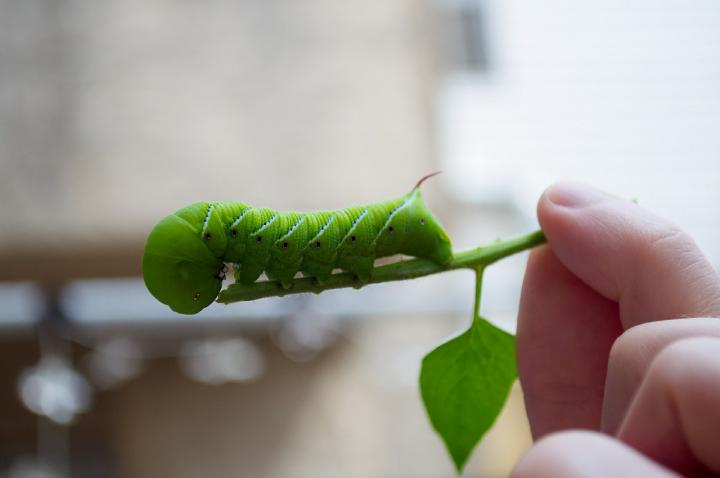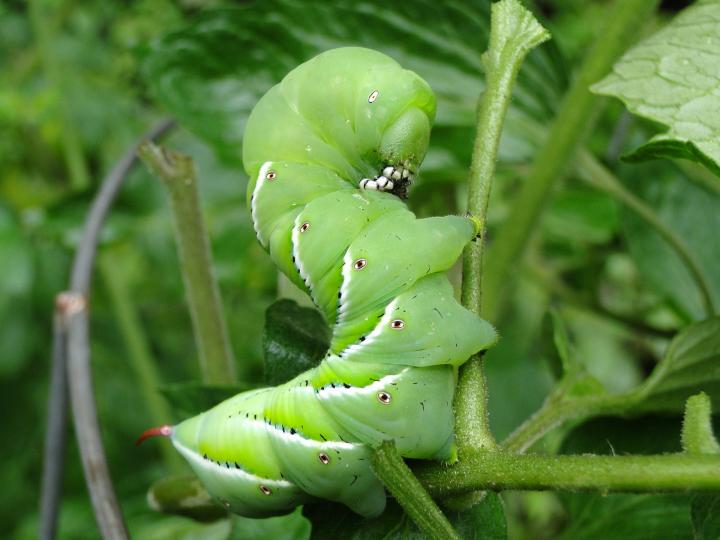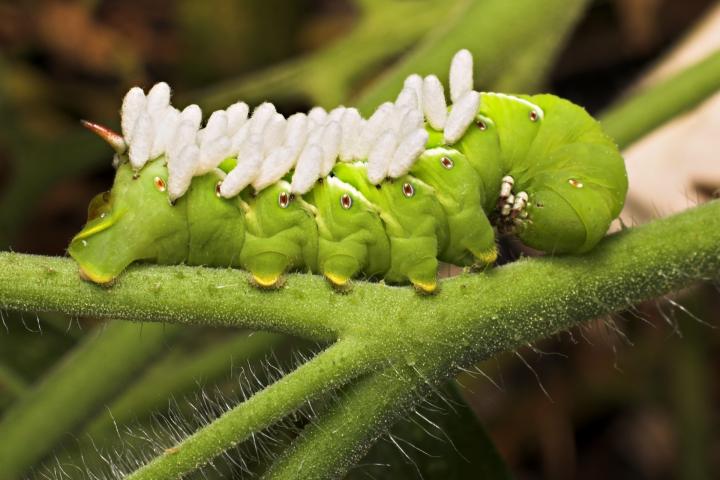
Here are tips on how to identify, control, and get rid of tomato hornworms.
What Are Tomato Hornworms?
If you’ve ever grown garden tomatoes, chances are you have dealt with these green caterpillar pests. They can be found in most any region of the US and can ruin your tomato crop in record time; they also feed on eggplant, pepper, and potato. They can blend in quite easily with the green foliage and feed non-stop, creating spotty and chewed leaves and fruit.
Tomato hornworms live according to the following life cycle:
- In late spring, large adult moths lay eggs on the undersides of foliage, which will hatch within a week.
- Caterpillar larvae will feed from 4–6 weeks before creating a cocoon for overwintering in the soil. If the weather is warm enough, larvae may only burrow for as little as 2–3 weeks.
- Moths will emerge in the spring, and will then lay eggs once again. More than one generation a year may be possible in warmer climates.

Identification
How to Identify Tomato Hornworms
Tomato hornworms can be up to 5 inches long—which can be quite a shock when you first come across one! They do the most damage in the caterpillar, or larvae, stage. They are pale green with white and black markings, plus a horn-like protrusion. The caterpillar also has eight V-shaped stripes on its green body. (They are not capable of stinging.) Tomato hornworms come from a mottled brown moth.
The larvae blend really well with the plant greenery. Just get used to a daily patrol, looking for hornworm eggs and small caterpillars. Here are some cues of infestations:
- Look closely at the TOP of your tomato leaves for dark green droppings left by the larvae feeding on the leaves. Then look at the underside of leaves and you’ll find a hornworm.
- Look for stems missing some leaves and wilted leaves hanging down. You may find white cocoons and their hornworm hosts nearby.

Tomato Hornworm Damage
If you see leaves with large holes and severe defoliation, devoured flowers, and/or scarring on fruit surfaces, you have tomato hornworms. The fruit also might be damaged by sunscald because of the reduced foliage.
Control and Prevention
How to Get Rid of Tomato Hornworms
- Handpicking is an excellent tactic for control if you have the time and patience, or a small garden. The caterpillars are not dangerous and cannot sting. If you are squeamish about crushing these large insects, drop them into soapy water instead.
- If the hornworm population or the area of your garden is too large, insecticides can be a useful control. You can use the botanical Bt (Bacillus Thuringiensis), which is a bacterium that acts as a stomach poison (but doesn’t harm other plants or animals). Please check with your local Cooperative Extension for a list of approved insecticides in your area.

Prevent Tomato Hornworms
- Till soil at the beginning and end of each gardening season to destroy overwintering larvae. Tillage has shown to cause up to 90% mortality.
- Keep wasps around; they’re beneficial insects which feed on hornworms and act as a biological control. You may see hormworms with wasp larvae attached, which look like grains of rice (see picture above). These attacked hornworms will have little effect on your plants, so leave them and let the wasps carry out their life cycle.
- To keep hornworms away from your tomato plants next year, try interplanting dill or basil; marigolds are also an excellent companion plant and keep many pests away.
Click for our Almanac Garden Plant Pest and Disease Control Library for information on all your common problems.
Plants Affected
- Tomatoes
- Eggplant
- Bell Peppers
- Potatoes









